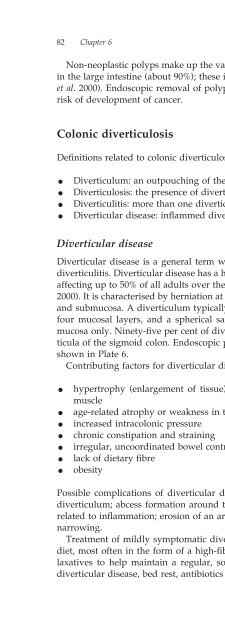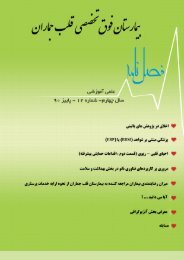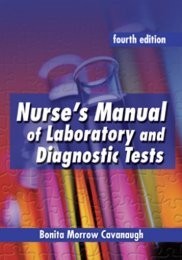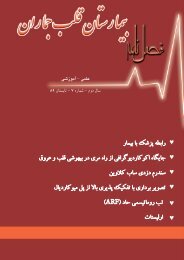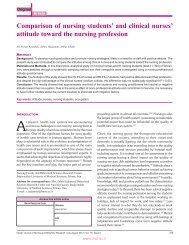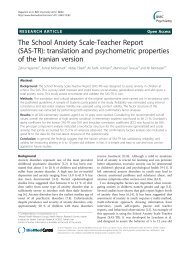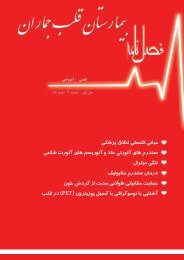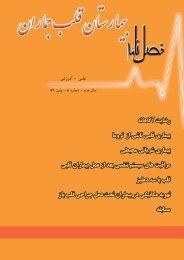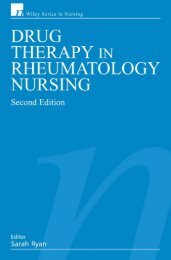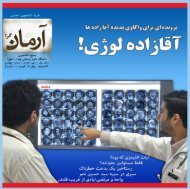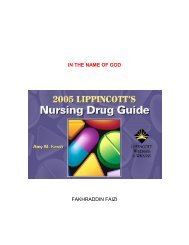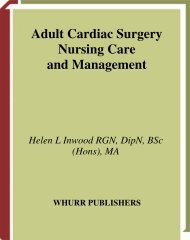- Page 1 and 2:
GastrointestinalNursingGraeme Smith
- Page 6:
Gastrointestinal NursingGraeme D Sm
- Page 10:
ContentsForewordvii1 Introduction 1
- Page 18:
Introduction 1Chapter 1Introduction
- Page 22:
Introduction 3Box 1.1Responsibiliti
- Page 26:
Introduction 5Box 1.6Post-procedura
- Page 30:
Introduction 7the fact that nursing
- Page 34:
Introduction 9Professional guidelin
- Page 38:
An Overview of the Gastrointestinal
- Page 42:
An Overview of the Gastrointestinal
- Page 46:
An Overview of the Gastrointestinal
- Page 50:
An Overview of the Gastrointestinal
- Page 54:
An Overview of the Gastrointestinal
- Page 58:
• excretion of waste products•
- Page 62:
An Overview of the Gastrointestinal
- Page 66:
The Oesophagus 25geal nerves to the
- Page 70:
The Oesophagus 27lower part of the
- Page 74:
The Oesophagus 29evidence to incrim
- Page 78:
The Oesophagus 31can mimic gastro-o
- Page 82:
The Oesophagus 33Management of acha
- Page 86:
The Oesophagus 35In patients with d
- Page 90:
The Oesophagus 37American College o
- Page 94:
The Stomach 39Figure 4.1 Anatomy of
- Page 98:
The Stomach 41pelled backward, coll
- Page 102:
The Stomach 43Figure 4.2 Summary of
- Page 106:
The Stomach 45duodenum. Ulcers in t
- Page 110:
The Stomach 47• age > 60 years•
- Page 114:
The Stomach 49The effectiveness of
- Page 118:
The Stomach 51Peptic ulcers are oft
- Page 122:
The Stomach 53In all patients it is
- Page 126:
The Stomach 55Resection offers the
- Page 130: The Stomach 57McKenry, L.M. and Sal
- Page 134: The Small Intestine 59The surface o
- Page 138: The Small Intestine 61Blood supply
- Page 142: The Small Intestine 63Between two a
- Page 148: 66 Chapter 5presentation and clinic
- Page 152: 68 Chapter 5that villous atrophy is
- Page 156: 70 Chapter 5is usually by the faeca
- Page 160: 72 Chapter 5Primary/secondary carci
- Page 164: 74 Chapter 5EVIDENCE-BASED GUIDELIN
- Page 168: 76 Chapter 6Figure 6.1 Arrangement
- Page 172: 78 Chapter 6the spinal nerves. Stim
- Page 176: 80 Chapter 6is caused by products o
- Page 182: The Large Intestine 83Diverticulosi
- Page 186: The Large Intestine 85Inflammatory
- Page 190: The Large Intestine 87severity of t
- Page 194: The Large Intestine 89therefore an
- Page 198: The Large Intestine 91and intermitt
- Page 202: The Large Intestine 93FistulaeThe t
- Page 206: The Large Intestine 95Monoclonal an
- Page 210: The Large Intestine 97Symptoms of p
- Page 214: The Large Intestine 99Pathophysiolo
- Page 218: The Large Intestine 101and altered
- Page 222: The Large Intestine 103Anorectal fi
- Page 226: The Large Intestine 105REFERENCESCl
- Page 230:
The Liver 107Figure 7.1 Position of
- Page 234:
The Liver 109Postnecrotic cirrhosis
- Page 238:
Hepatitis BThe Liver 111Hepatitis B
- Page 242:
The Liver 113Guidelines for the man
- Page 246:
The Biliary System 115Chapter 8The
- Page 250:
The Biliary System 117Table 8.1Elec
- Page 254:
PATHOPHYSIOLOGY OF THE GALL BLADDER
- Page 258:
The Biliary System 121bladder becom
- Page 262:
The Biliary System 123Brooker, C. a
- Page 266:
The Pancreas 125Figure 9.1(1996).St
- Page 270:
The Pancreas 127by separate capilla
- Page 274:
The Pancreas 129reflex. The control
- Page 278:
The Pancreas 131as an operation wou
- Page 282:
The Pancreas 133BACKGROUND READINGA
- Page 286:
Diagnostic Procedures and Tests in
- Page 290:
Diagnostic Procedures and Tests in
- Page 294:
Diagnostic Procedures and Tests in
- Page 298:
Nursing care during gastroscopyDiag
- Page 302:
Diagnostic Procedures and Tests in
- Page 306:
Diagnostic Procedures and Tests in
- Page 310:
Diagnostic Procedures and Tests in
- Page 314:
Diagnostic Procedures and Tests in
- Page 318:
Gastrointestinal Emergencies 151Cha
- Page 322:
Gastrointestinal Emergencies 153Box
- Page 326:
Investigations for lower gastrointe
- Page 330:
Gastrointestinal Emergencies 157BAC
- Page 334:
Pharmacology in Gastroenterology 15
- Page 338:
Pharmacology in Gastroenterology 16
- Page 342:
Pharmacology in Gastroenterology 16
- Page 346:
The Role of Psychosocial Factors in
- Page 350:
The Role of Psychosocial Factors in
- Page 354:
Inflammatory bowel diseaseThe Role
- Page 358:
Stressful life events leading to on
- Page 362:
The Role of Psychosocial Factors in
- Page 366:
The Role of Psychosocial Factors in
- Page 370:
The Role of Psychosocial Factors in
- Page 374:
Quality of Life in Gastroenterology
- Page 378:
Quality of Life in Gastroenterology
- Page 382:
Quality of Life in Gastroenterology
- Page 386:
Quality of Life in Gastroenterology
- Page 390:
Quality of Life in Gastroenterology
- Page 394:
Glossaryachalasia - a motor disorde
- Page 398:
hepatocyte - a liver cell.hepatoma
- Page 402:
Useful AddressesLocal addresses are
- Page 406:
Irritable Bowel Syndrome NetworkNor
- Page 410:
Code of Professional Conduct 197•
- Page 414:
Code of Professional Conduct 1993.9
- Page 418:
Code of Professional Conduct 201com
- Page 422:
Code of Professional Conduct 203ava
- Page 428:
206 Indexgall bladder, 115-23anatom
- Page 432:
208 Index
- Page 436:
Plate 5 (top left)Endoscopicappeara


